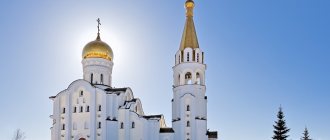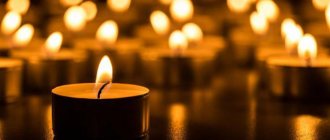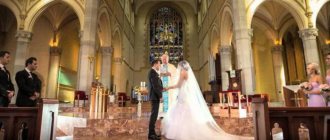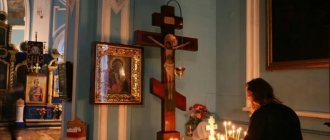Why does society need churches?
Despite the fact that more than half of our society is baptized in Orthodoxy, only a few percent of the total mass are actually churchgoers. Orthodoxy takes on an outward, formal appearance and often comes down to nothing more than the need to bless water for Epiphany and Easter cakes for Easter, and light candles for the health of one’s loved ones.
Read also: Why does a woman need to be beautiful?
Of course, the essence of the Orthodox faith is much deeper. In short, an Orthodox person is one who unites with Christ. All candles, services, prayer services, akathists and other necessary attributes of church life, in fact, pursue one single goal - to know God and be with Him constantly, every moment of your life.
What role does the temple play in this process of knowing God? The most direct one. For example, let's take a field prepared for sowing wheat. Is it possible not to throw this wheat into the ground, but bake bread from it and distribute it to the hungry? Is it possible not to spend money on the equipment needed to work in the field, but give it to hospitals? Can. But is this reasonable? Of course not. You need to sow fields to get results in the future.
Important! Temples are exactly the same – through them we make our way to Eternal Life. By attending divine services and partaking of the Holy Body and Blood of Christ, we lay down for ourselves the same “harvest” in our future life.
Just as an effective economy is needed to provide for the material needs of people, temples are also needed for the spiritual development of man and society as a whole. Let's take an example from the field of education - why are schools needed? Why waste time on boring lessons when you can play? Why pay salaries to teachers who can become workers and produce a physical product that can be touched and used in material life?
What benefits do temples provide in practice?
It is unlikely that the question of the need for a large number of churches will be relevant for a believer. For those who have come to understand the Orthodox faith, the church becomes a second home. Provocative questions about why so much money is spent on “religious paraphernalia” are asked by non-believers.
On the practice of church life:
- Why and for what does the church collect money?
- Does the church pay taxes?
- How to venerate icons correctly
But let's think about what kind of people do we want to live among? Even without believing in God, everyone wants to be surrounded by kind, sympathetic, honest and decent people. But it is precisely these qualities that are the basis of the Orthodox worldview. It is impossible to imagine a true believer who steals, deceives, and takes bribes.
Of course, now very often there are people who do all this, considering themselves Orthodox. But considering yourself a believer and being one are two different things. Orthodoxy fosters high moral standards in a person, and if a Christian persistently goes to God, he will definitely leave lying, theft and other bad qualities and sins.
Read about sins:
- Why is it a sin to play cards?
- The sin of covetousness and the fight against it
- About the sin of love of money
Otherwise it is simply impossible to know God. No matter how much we sometimes want to pleasantly combine the comfort of life and Orthodoxy, often these things contradict each other. And every person makes a choice - he is with God or without Him. And the more people choose God, the better, cleaner and kinder our society as a whole becomes.
Orthodoxy fosters high moral standards in a person
Kingdom
For most people (including religious ones), religion is a set of rules. Some praise these rules, some criticize them, but both agree that this is precisely a set of rules. In addition to the rules, in religion there are also sacred texts in which these rules are spelled out.
There are rules and texts in Christianity. But the center of Christianity is not here. Christianity is presence. At Christmas we do not celebrate the sending down of the Law or the giving of sacred texts. We celebrate the appearance of God who came and dwelt among us forever. As the Evangelist John says: In the beginning was the Word, and the Word was with God, and the Word was God. It was in the beginning with God. Everything came into being through Him, and without Him nothing came into being that came into being. In Him was life, and life was the light of men. And the light shines in the darkness, and the darkness does not overcome it... And the Word became flesh and dwelt among us, full of grace and truth; and we have seen His glory, the glory as of the only begotten from the Father (John 1:1-14). The Greek verb translated “dwelled” in the Bible has a grammatical form that means “dwelled and continues to dwell.” God took upon Himself human nature, became one of us, similar to us in everything, except sin. When Christ ascended to the Father, He did not “disincarnate” - at the right hand of the Father in heaven dwells the glorified Man; moreover, this Man dwells among His faithful here on earth: For where two or three are gathered in My name, there am I in the midst of them (Matt. 18:19). And behold, I am with you all the days until the end of the age (Matthew 28:20). In modern language, the words “Kingdom of Heaven” have simply become a synonym for the afterlife, the afterlife. “The kingdom of heaven be upon him,” we usually say about someone who has recently died. But the Holy Scriptures are talking about something else - about the reality of the dominion of Christ, which will appear in its fullness in the future, but is already present in our world. Subjects of the Kingdom already live among us; Moreover, any person can accept this citizenship. There will come a time when our true King, Jesus Christ, will return in glory and, as the Bible says, “every eye will see Him,” but even now He is present among His faithful. Christianity is not a set of rules; Christianity is Presence. This is why it cannot be “crossbred” with other religions, as people often suggest. You can “cross” sets of rules, but you cannot cross Presence with absence.
What is the Church and why is it needed?
Today we must understand that if people have a negative attitude towards the Church and experience antipathy towards the Orthodox clergy, we must understand that all this hostility is directed, first of all, against those caricatured ideas that are formed in the minds of these people by anti-Church propaganda.
Many people believe that the Church is an unnecessary intermediary between man and God, created by some “religious businessmen”, and all the rituals, ceremonies, requirements, etc. that exist in the Church were invented by “greedy priests” - in order to profit from people’s fears and ignorance.
The struggle against the Church at the state and public levels is well known. This struggle was (and is) aimed at maximizing the narrowing of the rights of the Church and the limits of its activities - both through the adoption of relevant state laws and through an ideological war against the Church.
In the recent past, in order to discredit the Church and its ministers, films, plays, television and radio programs, and literary works of anti-religious content were created.
In modern conditions, the Church is under attack from humanists - liberals and democrats, neo-pagans and modernist ecumenists, who in every possible way denounce and insult Orthodoxy, calling it “outdated”, “medieval”, “dense”, “lagging behind modern life”, seeking if not a complete ban, but serious reform, since it “restricts human rights.”
These propagandists need a Christ who will talk not about eternity, but about earthly life; Christ, Who will help prolong earthly passions and pleasures - but not the One who promises eternal bliss.
Such powers do not need the King of Eternity. They dream of an earthly, momentary king - a kind of “goldfish” that will fulfill any desires and whims.
For years, decades, the evil seed of unbelief was planted in the consciousness of man, caricatured ideas about the Church and the clergy were implanted, hostility towards everything connected with religion - and this contributed to the gradual alienation of the baptized Christian from the church environment, which, in the end, led to mass the alienation of baptized people from the Church in our days.
In fact, unfortunately, these misguided people do not know at all WHAT the Holy Church really is.
Meanwhile, the Church was created not by “priests,” but by our Lord Jesus Christ Himself (see Matt. 16:18).
He is the Head of the Church (see Eph. 5:23), Its founder and architect, and all the Sacraments existing in It were established by Him!
According to Saint Gregory Palamas, the Church is the fruit of His sufferings, actions and teachings.
It is (and only) Christ that determines the laws of life of the Church and its entire internal structure.
The Savior Himself established the sacred church hierarchy and gave the power to perform priesthood to His disciples, those chosen by Him for this purpose (not to all members of the Church!).
Initially, these were the apostles, who undoubtedly realized that they occupy a very special place in the Church, as the Apostle Paul says: “Everyone should understand us as ministers of Christ and stewards of the mysteries of God” (1 Cor. 4:1).
As the Church grew, as narrated in the Book of Acts of the Holy Apostles, a three-degree church hierarchy emerged (bishops, presbyters, deacons), which is continuously preserved in the Church through sacred ordination to this day.
The Church itself is the spiritual Body of Christ (see Eph. 1:22-23). And just as the body cannot live without its head, so the Church is unthinkable without Her Head - Christ, from Whom She receives all the grace-filled vital forces.
Thus, the Church is a living Divine-human organism that mysteriously unites within itself Christ and the members of the Church.
At the same time, it is impossible to comprehend with reason alone everything that happens inside the Church, for “this mystery is great” (1 Tim. 3:16).
Living participation in the life of the Church is necessary - and only in this case the Church reveals itself to man as the highest reality and truth.
One of the last words of Christ on Earth were: “Go therefore and teach all nations, baptizing them in the name of the Father and the Son and the Holy Spirit, teaching them to observe everything that I have commanded you” (Matthew 28:20 - not addressed to everyone people, but only to the apostles!
And only to them does the Savior entrust His Church, giving the apostles and their successors the right to teach the faith, build the Church, perform the Sacraments, preserve and preach the Holy Tradition!
At the same time, Jesus provides His Church with all the necessary means of spiritual revival, renewal, cleansing, strengthening, perfection and salvation of man.
Believers use these means when participating in church Sacraments and in divine services. This is how Christ’s promise of eternal coexistence with His followers is realized: “I am with you always, even to the end of the age” (Matthew 28:20).
Many centuries before the birth of Christ, the Wise Solomon prophetically wrote: “Wisdom built for herself a house and established seven pillars in it” (Prov. 9:1), speaking about God (Wisdom), who created His Church (house) on earth and established it in seven Sacraments (pillars).
These “pillars” are the seven Church Sacraments: Baptism, Confirmation, Communion, Repentance, Priesthood, Marriage, Blessing of Anointing (Unction).
This sevenfold number, on the one hand, corresponds to the seven gifts of the Holy Spirit (see Isa. 11:2-3), and on the other hand, it covers all the most important moments of a person’s life (from the cradle to the grave) and satisfies the main needs of our spiritual life.
The Orthodox teaching on the Sacraments proceeds from the fact that in the strict sense, every church sacred act is performed by the Lord Jesus Christ Himself, Who is the only Priest in the exclusive sense of the word. However, the Lord, as the Head of the Church, through His servants, distributes saving grace to those who are members of the Church.
Thus, the Sacraments are not performed on their own. They are one of the manifestations of the life of the Church. Where there is no Church, there is no reason to talk about the Sacraments.
This is what the Church is for!
Outside of Her, it is impossible to receive that gracious help, without which a person is not able to change his life, get rid of slavery to sin and everything that is an obstacle to the salvation of the soul.
By accepting holy Baptism, a person unites with Christ (becomes a Christian) and, thereby, becomes a part of His mystical Body - the Church.
That is why outside the Church there is and cannot be Christianity, there is no genuine, living life with God!
The church is made up of people whom God has called to perform a specific mission. The first Christians were not united by some abstract principles or values - they were all united by loyalty to the call of Christ. The Apostle Peter speaks of them as those who heard the Lord’s call to salvation and followed this call, and therefore constituted the “chosen generation” (1 Pet. 2:9).
In his letter to the Corinthians, the Apostle Paul calls the Christian community a “building,” himself a “builder,” and Christ the foundation: “for no one can lay any other foundation than that which is laid, which is Christ” (1 Cor. 3:11).
At the same time, the Church of Christ is created not by teaching, not by command, or even by the external action of Divine omnipotence, but is created from the Lord Jesus Christ Himself.
Often referred to in Scripture as the “Bride of Christ,” “The New Eve, the Church, emerges from the opened side of Christ—just as Eve emerged from Adam’s side.
From the pierced ribs of Christ flowed water and blood (John 19:34): the water of baptism and the blood of the Eucharist” (Prof. Olivier-Maurice Clément. Origins. Theology of the Church Fathers).
The Lord Jesus Christ created one Church: “I will build My Church, and the gates of hell will not prevail against it” (Matthew 16:18).
Please note: The Lord calls His goal the creation of ONE (i.e., ONLY) Church, and not churches.
In the parables of the Savior that relate to the Church, its unity is always emphasized:
“one flock” (John 10:16),
one vine (John 15:1-7), etc.
Ap. Paul also speaks of the Church in the singular:
“We, who are many, are one body in Christ” (Rom. 12:5);
“we were all baptized into one body by one Spirit” (1 Cor. 12:13);
“one Lord, one faith, one baptism” (Eph. 4:5).
The communication of grace to man, his sanctification and transformation is the purpose of the Church’s existence.
Holiness is the calling of every Christian. This is not an ideal, this is precisely the NORM for a genuine Christian, corresponding to God’s plan for him.
In Christ, man regains what he lost during the Fall.
That is why the Church is a place of salvation, because its main task is the salvation of man. She, like a loving mother, takes care not only of cleansing the soul, but also sanctifies all aspects of a person’s life, all types of his activities.
The first stage of salvation is the purification of the heart, the restoration of human nature. In this aspect, the Church is often compared to a hospital, for it is in it that the healing of the soul takes place.
“The Church is a spiritual hospital, and those who come to it should receive means for healing, apply them to their wounds and leave here with this” (St. John Chrysostom).
Salvation is inseparable from the Eucharist - the feast of the Kingdom, the Lord's Supper, thanks to which a person is most closely united with God. One could even argue that the purpose of the Church is to celebrate the Supper of Love.
It is through the Liturgy that the building of the Church is carried out. All believers, no matter what continent they are on, receive communion from the same Chalice of the same (and the Same) Body of Christ, the same (and the Same) Blood of Christ - and, thereby, become ONE-BLOOD brothers and sisters IN CHRIST!
By partaking of the Life-giving Body of Christ, a person becomes Christ’s, is grafted into His Body and thus becomes a living member of the Church. According to the expression of the Fathers of the Church, in the Eucharist we become “co-corporeal with Christ.”
The definition of the Church as a society is neither biblical nor patristic.
The concept of “society” is more applicable to the state, since “in union”, “in society” the emphasis is on human solidarity, and not on the unity of Divine life, as in the Body of Christ.
From the definition of the Church as a “society of fellow believers” (in this case, it is rather simply a description of who the Church consists of) one cannot deduce its main properties: unity, holiness, conciliarity and apostolate.
In addition, such a name can lead to the perception of the Church only as an organization belonging to the category of historical communities and, therefore, entirely subject to the influence of numerous factors of this world.
The following names of the Church are found in Scripture:
“The Body of Christ” (Eph. 1:22-23; 1 Cor. 12:12-13,27);
“The House of God” (2 Cor. 6:16; Rev. 21:3);
“The Bride of Christ” (2 Cor. 11:2; Eph. 5:32);
“Sheepfold” (John 10:1-16);
“Grapes” (Matt. 21:33-41; John 15:1-7).
All these names emphasize different aspects of the life or ministry of the Church. Of these, the essence of the Church is most fully expressed by calling it the Body of Christ. This definition, more than all other biblical names for the Church, expresses its essence.
Just like the human body, consisting of many organs, the work of which is coordinated by the central nervous system and the brain, the Church also consists of many members who have a single Head - the Lord Jesus Christ, without whom the existence of the Church cannot be allowed.
Church life itself is in many ways similar to organic life.
First of all, the organism is something whole. The main property of an organism is the unity of life. All members of the body need each other and are in coordinated unity with each other.
The body does not tolerate foreign elements within itself and does not allow their external, mechanical growth. An organism allows only such an addition to itself of elements hitherto alien to it when they are transformed into similar ones.
The body does not part with diseased members immediately, but after many efforts aimed at healing them.
As a living Divine-human organism, the Church is not limited only to the framework of this (visible) world - the Church also belongs to the world of higher reality, the invisible, spiritual world.
The division of the Church into earthly and heavenly (the so-called Church Militant and Church Triumphant) is very conditional. The Heavenly Church actively participates in the life of the earthly Church.
Believers have Eucharistic communion not only with brothers living on earth, but also with saints and with all those who have died in the faith, as evidenced by their commemoration at the Liturgy.
Moreover, Angels will also concelebrate the Eucharist: “Now the powers of heaven serve with us invisibly,” the Church sings in one of the Cherubic hymns. And therefore we can say with confidence that there is one Church of God in Christ, which in the fullness of its unity resides in every local church with its Eucharistic assembly.
“I pray for them: I do not pray for the whole world, but for those whom You gave Me (...) the world hated them, because they are not of the world, just as I am not of the world (...) It is not only for them that I pray, but also about those who believe in Me through their word” (John 17:9,14,20).
If we listen to the words of the High Priestly Prayer of Christ, we will see that the Lord is creating His Church in a world lying in sin - ordering the people of the Church not to live according to the lust of this world.
This world (entirely) cannot be saved, because “people loved darkness more” (John 3:19). Therefore, “to those who received Him, to those who believe in His name” (John 1:12), Christ offered the Gospel - so that people would not fight with “windmills,” but would improve themselves by being in the Church.
Unfortunately, today the opinion is increasingly spreading that in order to save the Church, it is necessary to unite all Christian denominations.
This is a big misconception.
There is no need to save the Church, because... It was created by Christ to save ourselves.
She herself, according to the word of Christ, is indestructible by the forces of evil (see Matt. 16:18).
Man, by himself, cannot save himself or anyone else - only the Lord saves us all in His Church.
We only need to belong to Her and not interfere with God saving us. By uniting with those who distort the Truth, people only push Christ away from them.
Is this really necessary?
However, it often happens that a person agrees with the proclamation of Christ that the Church proclaims, but does not live church life, does not participate in divine services and does not begin the Sacraments. “Faith must be in the soul,” they say in such cases. Is this true? The Christian faith is not just certain beliefs. This is a certain relationship. Holy Scripture compares this relationship to marriage, citizenship or military service. It hardly makes sense to talk about “marriage in the soul” or “citizenship in the soul.” Subjection to the heavenly Kingdom also cannot be reduced to something “in the soul.” Imagine that, say, the King of Narnia announces that he accepts everyone into his citizenship. Those who wish must appear at the Narnian embassy and swear allegiance to the king during a solemn ceremony; after this, they must confirm their decision by participating in regular receptions that the embassy arranges during the Narnian holidays. Now imagine a person who says: “at heart I am a Narnian, perhaps even a better Narnian than all those who gather at the Narnian embassy; therefore I will neither swear allegiance to the Narnian king nor celebrate Narnian holidays.” Wouldn't this seem ridiculous to us? What kind of Narnian is this who wants nothing to do with Narnia? We must also demonstrate our intention to be subjects of the Kingdom in a certain way, and Scripture clearly indicates how. God Himself sets the conditions under which we enter into a relationship with Him. Sometimes people contrast “spirituality” with “ceremonies,” but when you read the Bible, one unexpected thing becomes clear. God has surprisingly little to do with what we often call “spirituality.” One of the key moments of the Old Testament - the exodus of the Jews from Egypt - includes a detailed description of the ritual that believers were required to perform. They had to slaughter the sacrificial lamb, roast it over the fire and eat it during a ceremonial meal; and to anoint with its blood the doorposts of the house where they are: And the blood shall be a sign among you on the houses where you are: and I will see the blood and pass by you, and there shall be no plague among you to destroy when I smite the land of Egypt (Exodus 12 :3-13).Participation in the sacrifice and ritual meal (both at the moment of the exodus and later, when the people remember this event) is a mandatory condition of belonging to the people of God: and whoever is clean and is not on the road and does not keep the Passover, - that soul will be destroyed from his people, because he did not bring an offering to the Lord in due time: that man will bear the sin (Numbers 9:13). Only some insurmountable circumstances can excuse a person who does not perform the established ritual. Anyone who neglects worship of his own free will is considered to have alienated himself from the people of God. Modern man may be perplexed: why all this trouble with lambs, smearing the doorposts with blood and other incomprehensible rituals? Doesn't God know who believes in Him? Aren't human hearts open to Him? Doesn’t He see the soul of every person in full view? Undoubtedly, He does, and Scripture speaks about this many times. But God says that the sign will be precisely the sacrificial blood on the houses of believers - and it is precisely for this sign that “there will be no destructive plague.” Does God here promise safety to those who “believe in their hearts,” but considers the ritual an unnecessary hassle? No. God establishes the sign by which He recognizes His own - sacrificial blood on the doorposts. The faith in question here must be manifested in the symbolic act established by God - the offering of a sacrifice, the anointing of the doorposts with blood, otherwise God will not recognize it as faith. In the New Testament, a parallel is constantly drawn between the Passover lamb and the Lord Jesus, who is the Lamb of God who takes [on himself] the sin of the world (John 1:29). This understanding of Jesus as the Lamb is also evident in His words about the bread of life: Jesus said to them, “Truly, truly, I say to you, unless you eat the flesh of the Son of Man and drink his blood, you have no life in you.” He who eats My Flesh and drinks My Blood has eternal life, and I will raise him up on the last day. For My Flesh is truly food, and My Blood is truly drink. He who eats My Flesh and drinks My Blood abides in Me, and I in him (John 6:53-56). What is meant here is clear from other Gospels, where the Lord establishes the Sacrament of the Eucharist during the farewell dinner with the disciples, which he subsequently received title of the Last Supper: And as they were eating, Jesus took bread, and blessed it, and broke it, and giving it to the disciples, said, Take, eat: this is My body. And taking the cup and giving thanks, he gave it to them and said, “Drink from it, all of you, for this is My Blood of the New Testament, which is shed for many for the remission of sins (Matthew 26:26-28). The Lord says that He saves us through faith: the believer has eternal life (John 6:47). And He establishes certain actions in which we must express our faith - Baptism and the Eucharist. If we don’t want to express our faith in this way, then we don’t have it.
Orthodox Life
On the day of Pentecost I would like to say a few words about the meaning of the Church. Orthodox Christians themselves cannot always clearly answer why the Church is needed, so I hope it should be interesting.
In anti-religious and simply popular secular media, the topic is increasingly being raised that the Church is only a human institution established for a specific, not particularly plausible purpose. Some Protestants are not lagging behind here either. I think that each of us, to one degree or another, has encountered a situation where relatives, friends or colleagues at work had to respond to calls of this kind. What can we say about the notorious “I believe in my heart.” In our attempts to fend off sometimes disconcertingly stupid statements, we sometimes get confused. Each of us, of course, feels the importance and necessity of the Church, but it is not always possible to put our feelings into a clear verbal form. Pentecost is the birthday of the Church, so this topic is extremely relevant.
Let's immediately discard the opinion of atheists on this matter. The conversation with them should begin not with the Church, but with the existence of God. In our country, many people call themselves believers, but very few are real members of the Church. The majority are convinced that there is nothing to save them from, and those who have at least heard something somewhere are sure that the work of salvation is possible only on the basis of their internal, personal relationship with God. The only problem is that neither the actions nor the fruits of these relationships are visible. Thus, two important questions can be asked:
1. If God exists, then how is His grace communicated to man: independently of any external benefits or vice versa?
2. Can faith not only arise, but also mature and bear fruit by itself, based on the soul’s own efforts, or is guidance and external help still needed?
The salvation of a person does not happen automatically; we all understand that some people will go to eternal death. It follows that there is a certain principle of separation. Salvation will be received only by those who join the Savior and become partakers of Divine grace. No one denies that the Lord can act directly on a person, but we can say with confidence that such an action is not always obvious and tangible. Just imagine what would happen if all spiritual life were reduced only to subjective experience. It would have no objective basis. There would also be no criteria for the correctness of the chosen path or definition of the experience experienced. Everything would seem correct and necessary: the real perception of grace, and exaltation, and hallucinations, and attacks of mental disorders, and demonic machinations.
That is why the holy fathers always said that visible means are needed in the sanctification of a person. So, for example, St. John Chrysostom points out that if a person consists of two natures, then spiritual gifts are given to him in sensory images. In response to the argument about “faith in the soul,” we can cite the wonderful words of the Apostle Paul, expressed in rhetorical questions: “For “everyone who calls on the name of the Lord will be saved.” But how can we call upon Him in whom we have not believed? How can one believe in Him of whom one has not heard? how to hear without a preacher? (Rom. 10:13-14). From this quote we can conclude that in order for a person to become familiar with Divine grace, both visible actions and visible guidance—teaching—are necessary.
Think about the fact that Christ, during His earthly ministry, not only preached to everyone - whoever hears will hear - but also chooses a group of close disciples - the apostles. In the Gospel reading at the liturgy on the day of Pentecost, we hear the following words of the Savior: “Receive the Holy Spirit. Whose sins you forgive, they will be forgiven; on whomever you leave it, it will remain on him” (John 20:22-23). This is an indication of the special chosenness of the apostles. Subsequently, the Holy Spirit in the form of tongues of fire descends only on them, and not on all the listeners and followers of Christ. Any reinterpretations of the corresponding passage in Holy Scripture (Acts 2:1-11) are arbitrary and have no basis.
After His Resurrection, Christ appeared to the disciples for forty days, instructing them and preparing them to receive the Holy Spirit. On the day of Pentecost, it was the apostles who were the first to receive this. They became mediators of bringing down Divine grace to others. For a period of time, only the apostles had the authority to teach the Spirit through the laying on of hands. Let us remember that one of the seven deacons, Philip, baptized the Samaritans, but could not lay hands on them. For this purpose, the apostles Peter and John were sent to him from Jerusalem. Remember also the story of Simon the Magus, who offered Christ’s disciples money for the opportunity to receive the gifts of the Holy Spirit. But he was baptized, but his personal Pentecost never happened. This means that “faith in the soul” is not enough.
As we see, the Lord Himself established a certain order for the sanctification of man, where the apostles became the first mediators, leaders and teachers in such a great work. Can anyone doubt that the Savior wants to maintain and preserve the order established by Himself?!
We are all well aware that “faith in the soul,” faith without the Church, is only an excuse for our own inactivity and laziness. Those who hold a similar point of view also understand this, but they don’t want to admit it to themselves, because they will have to strain and change their lives. I hope that now we will have a couple of arguments in our “pocket” that, perhaps, will help someone take the path of salvation, which is impossible without the Church. Finally, let us recall the famous words sschmch. Cyprian of Carthage: “To whom the Church is not a mother, God is not a Father.”
Archpriest Vladimir Dolgikh
Why go to church?
We need to understand for ourselves what the Church is in general . The question of a worldly person, for whom the Church is something incomprehensible, alien, abstract, far from his real life, and therefore he does not enter into it. The Apostle Paul answers it in a way that no one else has been able to answer in the entire history of mankind: “The Church is the body of Christ,” and adds “the pillar and ground of the truth.” And he further adds that we are all “part of us,” that is, members of this organism, particles, cells, one might say. Here you already feel some very deep secret, it can no longer be something abstract - the organism, the body, the blood, the soul, the work of the whole body and the subordination, co-organization of these cells. We are approaching the question of the attitude of a worldly person and a church person to faith in God. The Church is not so much a legal institution and a social organization, but, first of all, it is what the Apostle Paul speaks about - a certain mysterious phenomenon, a community of people, the Body of Christ.
Photo:
Conversations with the priest. Why is our Church called Orthodox?
Audio |
Archpriest Pyotr Mangilev, vice-rector of the Yekaterinburg Theological Seminary for academic work, answers questions from viewers. Broadcast from Yekaterinburg.
– Today we will talk about why our Church is called Orthodox, how autocephalous, autonomous and self-governing Churches differ from each other.
Father, why is it our Orthodox Church? Can people who profess another religion also say that they are praising God correctly? What is Orthodoxy?
– The word “Orthodoxy” really means “to glorify God correctly.” Praising God correctly is very important. It is also important to correctly learn this glorification and correctly build your life in accordance with this teaching. Of course, those who profess other religions believe that they are the ones who correctly praise God. Nevertheless, the Orthodox Church takes this name for itself to emphasize that it believes correctly, lives in accordance with this faith, that is, it teaches the correct life and correctly glorifies the Lord. All these components are very important.
– In what period did this name begin to be used?
- Since Byzantine times. The word “orthodoxy” is a literal translation of the Greek word “orthodoxy.”
– There are such definitions of Churches as universal, autocephalous, autonomous, self-governing and local. What is this – a certain hierarchy of Churches or their varieties?
– Strictly speaking, in the mystical dimension the Church is one, it is one and indivisible, its Head is the Lord Jesus Christ. But earthly conditions presuppose the existence of different peoples, different languages, therefore the one Church exists among different peoples in different forms. The local Church, to put it very simply, is the Church that is “in place.” By and large, every diocese is a Local Church in the strict sense of the word. Today there are 15 autocephalous Local Orthodox Churches, which unite believers from different countries.
– That is, autocephalous and local are the same thing?
– These concepts are very close, although they have different shades. We can say about the autocephalous Church that it is local. Every autocephalous Church is local, but not every local Church is autocephalous.
The structure of church life is based on the territorial principle: one city - one bishop. All Christians in this city are subordinate to one bishop, the community led by the bishop forms the Local Church. In one place there is one bishop and one Church, in another place there is another bishop and another Church. These Local Churches are in Eucharistic communion with each other, they are united in faith and Spirit and represent the Universal Church. Among some peoples, dioceses began to unite into larger entities - metropolises and patriarchates, which formed the basis of the local autocephalous Churches that exist today.
– Question from TV viewer Lyudmila (Yaroslavl): “Please tell me, are the Old Believers also Orthodox?”
– The Old Believers, or Old Believers, are Orthodox in their dogma, if we talk about traditional agreements, but they separated from universal Orthodoxy, from the Russian Orthodox Church and are in schism. States of heresy and schism are special conditions of church communities. Heresy is a discrepancy with the Universal Church in terms of doctrine, and schism is separation for administrative and disciplinary reasons. There have been quite a few schisms in the history of Orthodoxy. The biggest schism in the Russian Orthodox Church is the schism of the Old Believers, although in the 20th century we also had other schisms. The Orthodox Churches are not in Eucharistic communion with schismatic communities, but there is a certain procedure for entry from these communities into the Orthodox Church. It differs from the order that is determined for those of other faiths who want to convert to Orthodoxy. Those who come to us from the Old Believer schism are received according to the second rite, that is, through confirmation, because we recognize the validity of their baptism. We do not recognize the grace of their priesthood hierarchy due to some canonical problems and, accordingly, we do not recognize their other sacraments except baptism. Baptism, as a sacrament absolutely necessary for the salvation of a person, can be performed not only by a priest, but also by a baptized layman, if there are special constrained circumstances, when there is neither a bishop nor a priest nearby. For example, in Soviet times, when there were no priests, lay people baptized. We recognize such baptism as valid.
At one time in the 9th century, Saint Photius pointed out that we cannot reject baptism by a layman, which is performed out of necessity in a country where it is not possible for a priest to perform baptism. But if there is such a possibility and one of the laity still dares to perform this sacrament himself, then it is declared invalid, and the person who dared to perform it can never be ordained a priest, because the one who trampled on grace before receiving it , will not hesitate to trample what he has received.
So, baptism in the Old Believer Church is recognized as valid, but you need to look at the circumstances of its occurrence. Each case requires special consideration.
All of the above concerns, of course, only traditional agreements and does not apply to sectarian deviations.
The Old Believer schism has not been healed to this day. The Russian Orthodox Church is making efforts to heal him. In particular, in 1800, the so-called points of Metropolitan Plato were adopted, on the basis of which two rites were allowed in the Russian Orthodox Church: the rite compiled according to the corrected books, and the old rite. The bishop assigned a priest to the community that wished to serve according to the old rite. This is how Edinoverie churches appeared. For example, the Holy Trinity Cathedral, which still exists today, used to be a cathedral of the same faith. In 1929, at a meeting of the Synod and in 1971 at the Local Council, decisions were made according to which both rites were recognized as equally saving. Now a special commission is dealing with issues related to working with Old Believer parishes.
– Question from TV viewer Evgeniy Aleksandrovich (Belgorod): “When the Apostle Paul wrote his Epistles to the Corinthians, when the Apostle John wrote the Apocalypse, what was the name of the Church? And when did it begin to be called Orthodox?”
– The Church was then called Christian, but the name “Orthodox” is quite applicable to the earliest historical periods of the existence of the Church.
The Church had certain characteristics that were given in the Epistles of the Apostle Paul, then these characteristics were assimilated by the Church in its historical existence. By calling the Church “Orthodox,” we are talking about one of its properties, which is that it correctly glorifies the Lord, believes correctly, and teaches correct life. There are other properties of the Church: the Church is One, Catholic, Apostolic and Holy. The characteristic “Orthodox” does not contradict anything.
– Perhaps we can clarify the question as follows: is there a specific moment when the Church began to be called not just Christian, but specifically Orthodox? We usually say: “I am baptized in the Russian Orthodox Church.” The word “Christian” is not used, but is implied.
– The word “Orthodox” begins to be used when the need arises to fight heresies, whose representatives also called themselves Christians. It was necessary to emphasize his belonging to the Church, which professes the correct faith. There are differences in faith between Christian denominations. That's why we say that there are Orthodox and heterodox Christians. We also consider non-Orthodox Christians and accept them into the fold of the Orthodox Church through Chrismation, just like the Old Believers. But we accept Catholics through repentance or through confirmation. It depends on whether the person has been confirmed. We accept Lutherans through confirmation, recognizing the validity of their baptism.
We also recognize the hierarchy of the Armenian Church, or the Nestorians, although we are not in Eucharistic communion with them.
– A little earlier we talked about the fact that there are special cases when baptism can be performed by a layman. But in order to become a full-fledged member of the Church, it is also necessary to perform the Sacrament of Confirmation. Should a person who at one time received baptism from a layman undergo the full ceremony if he is not sure that the rite with which he was baptized can be recognized as valid?
– If it is impossible to say with certainty whether a person was baptized or not, then baptism is performed according to a conditional formula. There can be no re-baptism. The 47th Apostolic Canon prohibits repeated baptism because the seal of baptism is indelible and a properly baptized person should not be baptized a second time. A priest who baptizes a person a second time, knowing that he has been baptized, sins gravely, and a person who deliberately goes for re-baptism commits a grave sin. If we doubt whether baptism has been performed, then baptism is performed according to the formula: “The servant of God (servant of God, name) is baptized if he is not baptized in the name of the Father...”, etc.
A person who has fallen away from Orthodoxy, but returned to the bosom of the Church, should not be baptized again, even if he converted to Islam, Judaism, Hinduism or went into paganism, even if the corresponding rituals were performed on him and he lived half his life professing a different faith. He returns to the Orthodox Church through repentance or, in some cases, through confirmation, but not through baptism. From the moment of baptism he is a member of the Orthodox Church, having fallen away or lost his way. He will never stop being a part of it.
– We talked about the fact that there are 15 Local Churches. Is there some kind of hierarchy between them?
– All Local Churches are equal to each other, although among them there are ancient and new ones that were formed in the 20th century. They have different destinies. The head of one Church is no more and no less than the head of another. But there is a so-called primacy of honor, because when the primates of different Local Churches gather together for worship, they must stand in some order at the throne of God. In first place is the Ecumenical Patriarchate. Today it is the Patriarchate of Constantinople. In the first millennium of the existence of Christianity, the Roman Church was in first place, but it separated from universal Orthodoxy and fell into heresy, after which the Patriarchate of Constantinople, which was in second place, took first place. Second on the list of Churches is the Church of Alexandria, followed by the Patriarchate of Antioch and the Patriarchate of Jerusalem. The Russian Orthodox Church is in fifth place. The youngest American Church closes the list.
– However, the Russian Orthodox Church is the largest.
- Yes, but nevertheless, in terms of primacy of honor, she is fifth.
– Question from TV viewer Zinaida: “If a person died while baptized in the Lutheran faith, how can he be remembered in an Orthodox church?”
– There is a special rite of funeral service for deceased non-Orthodox Christians. With blessing, apparently, a memorial service can be performed according to this rite. But now such a practice is not accepted in our Church. I think that in your case, prayer at home and doing good deeds in memory of the deceased can help. But notes with his name should not be submitted for proskomedia and liturgy, since he was not in communion with the Orthodox Church. The Church entrusts his fate to the will of God.
– On the forum of the Soyuz TV channel on the social network VKontakte, Lyudmila Silaeva asks how to distinguish a sect from the Church and how we should treat non-Orthodox Christians.
– Saint Irenaeus of Lyons said that here we must look at succession. Our episcopal succession reaches to the apostles and to Christ, and the succession of heretics reaches to the leaders of their heresies. We know for sure and affirm that the episcopate of the Orthodox Church has, through a series of ordinations, a grace-filled connection with the holy apostles and the Lord Jesus Christ Himself. This is the main distinguishing feature.
– What is an autonomous Church and what is the difference between autonomous Churches and autocephalous ones?
– Autocephalous Churches are independent in their governance. Autonomous Churches have a greater degree of independence in making decisions concerning their internal affairs, but they are not completely independent, but are subordinate to one or another autocephalous Church. In order to become an autocephalous Church, a number of conditions must be met. One of these conditions is the presence of a certain number of bishops. According to the first rule of the Holy Apostles, bishops are appointed by two or three bishops. An autocephalous Church must have at least four bishops. If one bishop dies, the other three can appoint another bishop in his place by their internal council. The Japanese Autonomous Church currently has two bishops. But the Japanese and similar autonomous Churches are within the traditions of their people and are distinguished by their cultural originality.
– Question from TV viewer Tatiana: “In the Revelation of John the Theologian there is a message to the seven Churches. Which type of these Churches does the Russian Orthodox Church belong to? Or does it combine the properties of all these Churches?”
– In the Ancient Church, each diocese was an independent Church. The process of formation of metropolises and patriarchates took place during the first three centuries of the existence of Christianity. The main church structures developed depending on life circumstances. This process continued further, but the basic principles were laid in the first three to four centuries. The characteristics that were given to certain Churches can probably be applied to our modern life in individual cases. According to the formal principle, the similarity lies in the fact that both those Churches discussed in the Revelation of John the Theologian and the Russian Orthodox Church are local.
– On the forum of the Soyuz TV channel on the social network VKontakte, Lydia Manna writes: “Father, when my husband, a former Catholic, converted to Orthodoxy, they began to condemn me for forcing my husband to convert to Orthodoxy, which was wrong. My husband voluntarily converted to Orthodoxy, without my pressure. We have been together for ten years now, praying and fasting. How can I properly explain to people that my husband did not commit the sin of apostasy from the Catholic faith?”
– Firstly, someone will always say something about us, even if we do the right things. You know that choosing your husband was a conscious decision. I don't know how to explain this to people, because if they want to judge, they won't listen to any explanation. And if they have an understanding and see the sincerity of his choice, then there is no need to explain anything. I don't think you need to worry too much about this. You just need to live and testify to your faith with your life. The life of your spouse in the Orthodox Church will be the best answer to all perplexities.
– But the husband should probably clearly explain the reasons for his action?
- Yes, let him talk about it. But he, apparently, speaks, since such bickering arises. But, first of all, his life itself must be an answer and a testimony.
– Question from TV viewer Olga Alekseevna: “In 1978, my brother was drafted into the army. Grandmother said that she baptized him herself, since there was neither a church nor a priest nearby. Six months later, my brother died. I am ordering funeral services for him in the church. Is this a sin for me and for the priest who commits them?
– In Soviet times, many were baptized in this way. Even if a person died before such baptism was completed with confirmation, he is still considered an Orthodox Christian. If during his lifetime he somehow related himself to the Orthodox Church, then all funeral services can be performed. And now there are situations when baptism performed by a layman is recognized, even if it was not supplemented by confirmation. For example, if a child was born non-viable and has only a few hours left to live.
– Elena Vinogradova asks on the social network VKontakte: “My child was baptized in the maternity hospital. The priest read a prayer and sprinkled him with holy water, but said that he needed to complete the baptism in the church. When we went to church, they also read a prayer there and brought the child to the icons. The godparents were not present at the hospital, but stood nearby at the church. When the priest read the prayer, I held the child in my arms. Has the baptism been completed in full and are the godparents considered godparents today?”
– As far as I understand, the priest who performed the baptismal ceremony was aware of the ceremony that was performed in the hospital. Of course, it is difficult to judge in absentia, but still I believe that the baptism was valid. Most likely, the child was baptized in the hospital, and then the baptism was completed with confirmation and the necessary prayers. The Trebnik contains a short rite of baptism, which can be performed by a priest in urgent situations, for example in case of mortal danger. It is assumed that if a person survives, then baptism can be completed with clerical prayers and so on. The godparents who were present in the temple are such because they renounced Satan and united with Christ, saying the appropriate prayers.
– We talked about what an autocephalous and autonomous Church is. But there is also such a thing as a self-governing Church. What it is?
– A self-governing Church is a Church that has yet to become autonomous. It does not yet have the powers that an autonomous Church has, but its powers exceed those of a diocese or metropolitanate.
– Question from TV viewer Vladimir: “I have a question about the split. I read that Patriarch Nikon rewrote a lot and added that he was very concerned about the purity of the faith. There were a lot of superstitions and pagan overlays in our faith at that time. And the people who cared about these superstitions went into schism. I would like to know your opinion on this issue."
– This is a slightly simplified view of the situation. Of course, there were superstitions then, and they still exist now. The temptation of paganism exists, alas, in every person. Not only those who were committed to superstitions, but also educated people went into schism. Patriarch Nikon really implemented an extensive program to correct church books. But his innovations had both a positive and a negative side, because the correction work was carried out in a hurry and not always skillfully. But this does not mean that the books were damaged as a result of the reform or that they were unusable until the 17th century, that is, before the reform.
The work of correcting liturgical books, editing, and correction must be ongoing. Liturgical books are translated books, so we are constantly faced with the question of the accuracy of the translation, its identity in conveying shades of meaning. Work to improve the translation can go on endlessly. When rewriting text, certain errors inevitably arise.
Patriarch Nikon faced a very difficult task: to unify two liturgical traditions, one of which developed in the northeast of the country, and the other in the west. In 1458, the final division of the Metropolis of Kyiv and the Metropolis of Moscow took place. The Moscow Metropolis became autocephalous, and the Kiev Metropolis was subordinated to the Patriarch of Constantinople. Due to its subordination to Constantinople and greater proximity to Europe, the Western Russian metropolis had more contact with foreign Churches. It was influenced by Greece, Poland, the Balkan countries, and Romania.
Both church traditions developed within the framework of the Church Slavonic language; they were very close and influenced each other.
The correction of liturgical books began under the previous Patriarch Joseph, but during the reign of Patriarch Nikon, a different concept was used as the basis for working with books, which provoked a conflict. Books sometimes ruled very roughly, breaking ritual habits. All this was superimposed on social problems. The sharp actions of the reformers aggravated the situation and led to the events that occurred.
It must be taken into account that the Church Slavonic language developed. It is difficult for us, who understand modern Church Slavonic, to understand the language of the 10th century.
The activities of Patriarch Nikon cannot be depicted only in black and white. But those who resisted reforms also had their own reasons.
– Sometimes there are reports in the media that the heads of two Local Churches have met and discussed the issue of Eucharistic communion. What is meant here and with which Local Churches is the Russian Orthodox Church in Eucharistic communion?
– The Russian Orthodox Church is in Eucharistic communion with all fourteen Autocephalous Churches. Eucharistic communion presupposes the possibility of sharing the Divine Liturgy and sharing Communion. All Churches unite around one common Chalice. The Body of Christ is one for all Churches. The absence of such communication indicates that something is wrong between the Churches. For example, we do not have Eucharistic communion with Roman Catholics, we do not have communion with the Ancient Pre-Chalcedonian Churches, although we conduct dialogue with them and hold joint events.
There are situations when communication between Local Churches is interrupted. Now this state of affairs has developed between the Patriarchates of Jerusalem and Antioch. They had a conflict over the situation in Qatar. One Local Church began to interfere in the internal affairs of another, as a result of which the Churches interrupted Eucharistic communion. This does not mean that one of the Churches has fallen into heresy. The Russian Orthodox Church is in Eucharistic communion with both Churches. But there is a problem between the Patriarchates of Jerusalem and Antioch, and until it is resolved, joint ministry around the same Chalice is impossible for these Churches. It would be hypocritical. After all, we cannot receive communion if we have quarreled with our neighbors until we are reconciled with them. The situation is the same here, only on a larger scale.
– Do I understand correctly that if our Church is in eucharistic communion with some other Church, then we can participate in the liturgical life of these Churches and receive communion?
- Yes, sure. The most common option is when pilgrims travel to Jerusalem, where the clergy of different Local Churches serve together. We can, for example, take communion in Orthodox churches in Georgia, and Georgians can take communion here.
– That is, it is not necessary for our clergyman to be present at this service?
- No, not necessarily. But we ourselves must somehow indicate the fact that we are Orthodox, come to confession, and so on.
– Question from TV viewer Victor: “Now in churches they sell candles or some other attributes for money. And the Bible writes about how Jesus Christ drove the money changers out of the temple. Why do we sell candles? Why can't you light a candle for free? In 2008, my family tragically died in a plane crash in the city of Perm. Sometimes I have financial problems and I can’t buy a candle.”
– The issue of financial content is a complex issue. In order for the Church to exist, money is needed. The building in which we come to pray requires maintenance; we need to pay for electricity, water, heating, and pay the cleaning lady’s salary. The church exists on donations from believers. The systems for organizing these donations may vary. Trading candles is perhaps not the best way to organize such an organization, but it is difficult to arrange it any other way. It would be good if we had large, strong parishes in which parishioners could pay tithes. Then the candles could be put out for free use. I have seen this practice in some parishes. There is a donation mug next to the candles, and everyone puts in as much as they can.
– At the same time, no one says that you necessarily need to buy a candle or make some kind of donation.
- Yes, sure. No one takes money for entering the church, for confession, for Communion and other sacraments. That is, participation in the life of the Church is free for us. However, of necessity, there is some kind of donation collection system, which, of course, is not ideal.
Host Dmitry Brodovikov Transcript: Ekaterina Ivanova
History of the temple
The current liturgical regulations prescribe that services should be performed mainly in the church. As for the name temple itself, templum, it came into use around the 4th century; earlier, pagans used this name for their places where they gathered for prayer. For us Christians, a temple is a special building dedicated to God, in which believers gather to receive the grace of God through the sacrament of Communion and other sacraments, to offer prayers to God that are of a public nature. Since believers gather in the temple, constituting the Church of Christ, the temple is also called “church,” a word derived from the Greek “kyriakon”, which means “house of the Lord.”
Consecration of the Cathedral of the Archangel Michael, founded in 1070. Radzivilov Chronicle
Christian churches, as special religious buildings, began to appear among Christians in significant numbers only after the end of persecution by the pagans, that is, from the 4th century. But even before this, temples had already begun to be built, at least from the 3rd century. The Christians of the first Jerusalem community still visited the Old Testament temple, but to celebrate the Eucharist they gathered separately from the Jews “in their homes” (Acts 2:46). During the era of persecution of Christianity by pagans, the main place of liturgical gatherings for Christians was the catacombs. This was the name of special dungeons dug for the burial of the dead. The custom of burying the dead in catacombs was quite common in pre-Christian antiquity, both in the east and in the west. Burial places, according to Roman law, were considered inviolable. Roman legislation also allowed for the free existence of funeral societies, no matter what religion they adhered to: they enjoyed the right of assembly in the burial places of their fellow members and could even have their own altars there for the performance of their cults. From this it is clear that the first Christians widely used these rights, as a result of which the main places of their liturgical meetings, or the first temples of antiquity, were the catacombs. These catacombs have survived to this day in different places. Of greatest interest to us are the best preserved catacombs in the vicinity of Rome, the so-called “catacombs of Callistus.” This is a whole network of intertwining underground corridors with more or less extensive rooms scattered here and there among them, like rooms called “cubiculum.” In this labyrinth, without the help of an experienced guide, it is very easy to get confused, especially since these corridors are sometimes located on several floors, and you can move from one floor to another unnoticed. Niches were hollowed out along the corridors, in which the dead were walled up. The cubes were family crypts, and the even larger rooms of the “crypt” were the very temples in which Christians held their services during times of persecution. The tomb of the martyr was usually installed in them: it served as a throne on which the Eucharist was celebrated. This is where the custom of placing holy relics in a newly consecrated church inside the altar and in the antimension, without which the Divine Liturgy cannot be celebrated, originates. On the sides of this throne or tomb were places for the bishop and presbyters. The largest rooms of the catacombs are usually called “chapels” or “churches.” In them it is not difficult to distinguish many of the components of our modern temple.
Why are temples needed?
Hello , dear brothers and sisters!
How can we become true sons of the Kingdom of God? How can we, sinful people, mired in the vanity and noise of the world, become one of our own for the Lord Jesus Christ? The answer to this question is given by Christ himself: “I will build My Church, and the gates of hell will not prevail against it” (Matthew 16:18).
Christ left us a Church that gathers the faithful. The Church preserves and proclaims the word of God. All the sacraments established by God are performed in it. The Church helps its members follow the path of salvation. For many hundreds of years it has preserved the unity of the continuity of faith since apostolic times.
Life and a blessed eternity are destined for us if we follow Christ. Let's recognize Him. And this is possible only in the bosom of the true Church, which He created.
The concept of church has several meanings. First of all, this is a meeting of believers. Secondly, the hierarchical, organizational structure. And third, the church is a temple. And the third meaning of the Church will be discussed further.
Do we need temples and churches at all? Did ancient Christians have them? Does God “dwell” in the temple?”
these questions exhaustively: God dwells everywhere. A church is a place specially dedicated to God. Built for the glorification of God, for prayer, for performing the Sacraments.
A thousand years before the Coming of Christ, having built the Temple in Jerusalem, King Solomon addressed God like this: “Truly, shall God live on earth? Heaven and the sky of Heavens cannot contain You, much less this temple that I have built. But consider the prayer of Your servant and his petition, O Lord my God; Hear the appeal and prayer with which Your servant begs You now. Let Your eyes be open to this temple this day and night, to this place about which You said: “My name will be there”; hear the prayer that Your servant will pray in this place... hear in Your dwelling place, in Heaven, hear and have mercy.”
This is a very important statement: Does God live on earth? We understand perfectly well that Heaven and the sky of Heaven do not contain God, but we ask you to pay attention to our sincere prayers, standing before God, repentant bows, and come here where we have gathered together.
There were temples in the Old Testament, and ancient Christians also had temples.
In the Gospel of Luke we read that after the Lord’s departure to heaven, His disciples “always remained in the temple, glorifying and blessing God. Or the Apostle Paul says: “I came to Jerusalem to worship,” and in another place: “I prayed in the temple.”
And here is the message from the book of the Acts of the Apostles: “For a whole year [the first disciples of Christ] gathered ... in church and taught quite a number of people, and the disciples in Antioch for the first time began to be called Christians.” Here the “church” is the Jerusalem Temple. Initially, Christians prayed in the Jerusalem Temple, in synagogues, and after the destruction of the Temple in 70, they began to build their own temples and churches.
John the Theologian convincingly informs us in the Apocalypse that the temples will be preserved until the Second Coming of Christ: “The man of sin will be revealed, the son of perdition, who opposes and exalts himself above everything that is called God or that is holy, so that in the temple of God he will sit as God, betraying yourself for God."
Why church if God is in the soul?
Answers from priests about the meaning of temples
In this aspect, the construction of new temples can be seen as an investment in a brighter future. One of the Orthodox priests serving in a large city parish gave the following example:
One day, leaving the entrance, he saw how two cars could not pass each other on a narrow road, and almost collided head-on. Both drivers jumped out of the car and attacked each other with accusations and threats. It came to a physical fight, and both men, clinging to each other, rolled along the asphalt.
What is the church for?
What is the Church for? This question cannot be answered unambiguously, because believers and non-believers will answer it differently. If for the former the Church is Truth and Life, then for the latter, at best, it is a kind of social non-state institution, the activities of which have some useful aspects. The Church gives a person the main thing - Faith, Hope, Love. For a believer, the question of whether God exists is meaningless, because all life is a visible confirmation of His existence. God reveals himself to those who seek Him. How does a person take the path of faith? If his parents did not instill faith in him from childhood, then most often he comes to it in days of difficult life trials. When a person has nothing left to hope for, he turns to God. You can call it stupidity, the act of a weak, desperate person. And we can say that in the soul of a confused person, for the first time in many years, something true woke up and reached out to the Light. On days when everything is going well for him, a person does not turn to God, not feeling the need for it. The craving for God usually awakens precisely during periods of life turmoil.
To understand a believer, you must yourself be a member of the Church. Observation from the outside in this case will not be objective, because it is impossible to understand the essence of faith while remaining on the sidelines. This is the case when you need your own experience to understand. Coming to the Church, a person will not necessarily find only good things in it. Not every believer is a model of kindness and humility; for a beginner - a person just beginning to comprehend the basics of faith - the period of becoming a church member can become a rather difficult test. Everything is unusual, incomprehensible, ignorance of the rules of church etiquette can cause complaints from parishioners. At this stage, many people who are drawn to God leave the Church forever or temporarily. But those who remain have a wonderful opportunity to touch a huge layer of spiritual heritage. First of all, through church literature. For the Russian Orthodox Church, these are, of course, the books of the Old and New Testaments, as well as the works of the Holy Fathers. It is in the books of the holy fathers that you can discover an inexhaustible source of wisdom and faith. Isaac the Syrian, Ignatius Brianchaninov, John of Kronstadt, Theophan the Recluse and many others - their books are full of Truth and can provide invaluable help to any person.
Does the Church make a person better? Yes. By reading the books of the holy fathers, a believer can realize many of his mistakes and get rid of bad character traits. Become calmer, softer, kinder. And stronger, because faith is a huge force. A believer feels himself to be a conductor of God’s will, he feels God behind his back, which gives him perseverance, courage, patience, and readiness to endure any trials with honor. At the same time, he not only believes in God, but believes God. He does not believe at random, not because he simply chose to believe - he knows that help is really being provided, because he has received it hundreds, thousands of times. Once may be a coincidence, twice, ten, but when help is provided time after time, when he sees that sincere prayer and faith in God allow the most difficult situations to turn for the better, he no longer needs confirmation. He knows that God exists, sees how the Lord helps him, protects him, and guides him through life. The church becomes his stronghold, his support. In this support, in daily communication with God, he draws his strength.











